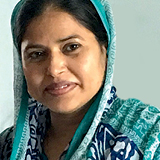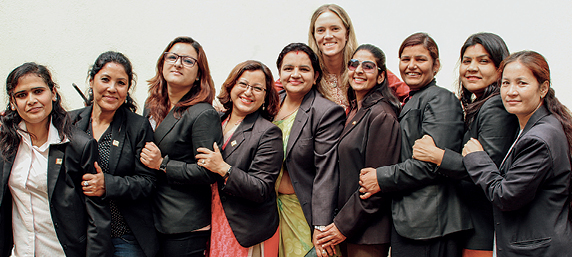When I was young, I saw that women around me didn’t have knowledge about their legal rights and their access to justice was affected by poverty, ignorance, poor status and lack of family support. I wanted to do something to help poor women.
MOHNA ANSARI,
Nepal Human Rights Commission
Women represent just 10 per cent of the registered lawyers in Nepal even though they have been allowed to practise law for almost 60 years. SARAH MELLOWES, a solicitor and the Sydney Pro Bono Coordinator for DLA Piper, writes how being part of a recent international training mission to Kathmandu aimed at improving the skills of a growing cohort of Nepali women lawyers reinspired her passion for the rule of law and energised her to use her legal skills to make a difference.
Can you imagine practising law in a country where even the language makes your work tougher? In Nepalese, the word used to address a judge is “Shreeman”. It’s an antiquated term predating when women were finally allowed to practise law in 1960. When used by men, “Shreeman” translates to “officer”, but when used by women it translates to “husband”. The very terminology required to address judicial officers thus has the effect of making women uncomfortable in the court room and can affect their confidence.
Female legal professionals have tried to change the term, as they are often mocked in court and by clients for referring to judges as “husband”, or are criticised for being discourteous if they fail to address the judge as such.
Despite the challenges and difficulties they face, the women lawyers of Nepal are motivated, dedicated, and determined to make a difference. In March, I joined a team of eight DLA Piper lawyers from offices around the world to deliver a legal training workshop, the Women Lawyers Professional Skills Enhancement Training, for 60 female Nepalese lawyers. The six-day training program focused on legal ethics and professional responsibility, corporate and commercial law, arbitration, and intellectual property and technology. It was the biggest event of its kind in Nepal and was organised by New Perimeter, a non-profit affiliate of DLA Piper, which provides long-term pro bono legal assistance in under-served regions around the world, and Canadian non-government organisation Women Lawyers Joining Hands (WLJH) and the Nepal Bar Association (NBA).
The aim of the training was to build and develop the capacity of female lawyers and is part of a larger, long-term initiative of WLJH and the NBA to provide opportunities for female lawyers in Nepal for professional development and high quality training, particularly focusing on the corporate and commercial sector.
Nepal is a deeply patriarchal society where women face particular hardship. Women continue to be marginalised and excluded from economic and social opportunities, generally because of illiteracy, poverty, and conservative social and cultural norms.
About 60 per cent of girls do not finish secondary school, female literacy is less than 50 per cent, and almost half of girls marry before the age of 18 due to economic and family pressures.
One of the guest speakers was Mohna Ansari. She was born into a poor Muslim family in Nepalganj, in Western Nepal, and was determined to make a difference from a very young age. Her parents were uneducated and her father ran a carpentry shop from the family home.
“When I was young, I saw that women around me didn’t have knowledge about their legal rights and their access to justice was affected by poverty, ignorance, poor status and lack of family support. I wanted to do something to help poor women,” Ansari recalls.
When she was still just a small child, a local feudal landlord influenced the police and the court, seizing the family property and forcing them out on the street. “We became homeless. Our family took shelter in a makeshift structure, the vegetable market, which was built by the municipality and wasn’t in use,” Ansari says.
She believes this was what inspired her father to support her education and encourage her to have a career in law.
“When I completed high school, our relatives pressured my parents to stop my education and find a groom for marriage,” she says.
However, under the tutelage of a respected female lawyer who had met Ansari’s father and heard his story, Ansari received legal training in Kathmandu before becoming not only the first person in her family to graduate, but the first female Muslim law graduate in Nepal.
About 60 per cent of girls do not finish secondary school, female literacy is less than 50 per cent, and almost half of girls marry before the age of 18 due to economic and family pressures.
SARAH MELLOWES,
Solicitor, DLA Piper
After university, she obtained her license to practise as a lawyer and became the first female Muslim lawyer in the history of Nepal. Today, she is the only female member of Nepal’s Human Rights Commission, where she fights tirelessly for Nepal’s most marginalised and vulnerable people.
Sheri Meyerhoffer, a Canadian lawyer and former Head of Mission for the Nepal program of the International Institute for Democracy and Electoral Assistance (IDEA), co-founded Women Lawyers Joining Hands after she was struck by the significant challenges facing women in Nepal and wanted to do something to improve their prospects. Meyerhoffer says Nepali families send their sons to foreign law schools, but rarely their daughters.
“This experience gives these male lawyers opportunities not available to female lawyers trained in Nepal, such as exposure to international legal knowledge, skills, attitudes and networks,” she explains.
“Nepal needs more women lawyers. You need these women at the table as the laws are being written to make sure the laws comply with the principles of the constitution. It’s critical they are there. We need more women who have litigated, who have adjudicated, and who can sit on a bench and judge. The problem right now is having a large enough and broad enough pool of women ready to become appointed to all these positions.”
Organisations such as WLJH and programs such as the Women Lawyers Professional Skills Enhancement Training Program are important tools that can help create a critical mass of female lawyers empowered to participate in and influence law reform through their involvement in and appointment to the bodies and institutions that write, interpret and implement the law. Renuka Shah, a practising lawyer and one of the participants in the training program, says that even if women have quality education and are highly qualified, they are not given the opportunity they deserve.
“It is not because of our weakness but because of society’s so-called rules,” Shah explains. “We need to break it down and that will take time.”
Inspired by her father, Ram Kumar Prasad Shah, a former Chief Justice of Nepal, Shah is one of the only female lawyers from her region of Jankapur in Eastern Nepal. Even with her legal pedigree, she is faced with daily obstacles in her professional practice, simply because she is a woman. Very few female lawyers in Nepal set up private practice.
“There are a lot of challenges for women in Nepal, particularly in the advocacy sector,” Shah says.
“The people of Nepal don’t trust women lawyers. If there are two lawyers – one woman and one man – the clients will directly ask for the man.”
Ansari describes a similar problem. “When I became a licensed attorney and started my practice, the clients did not believe I could plead their cases in the court the same as a male lawyer could,” she says. “Only those who couldn’t pay the male lawyers’ fees came looking for my services.”
As a result, women fall, or are pushed, into certain areas of law and are rarely paid. This is another reason many female lawyers in Nepal decide to work for NGOs or governmental organisations, which pay a regular salary. Many people recount that in the first few years of a lawyer’s career, male or female, those in private practice do not make a lot of money. So unless women have the support of their families they are often unable to pursue careers in private practice and, therefore, are not exposed to corporate and commercial law.
“Those who could pay would hire male lawyers. This made it difficult for the female lawyers to earn a living through private law practice,” says Ansari.
“Due to widespread poverty, many clients do not have the capacity to pay for legal services.”
After a turbulent political history, the promulgation of Nepal’s new constitution in 2015 has paved the way for the establishment of a democratic political system. Despite these positive changes, Aayushi Koirala, a trainee in the program who works as an associate for a law firm in Kathmandu, believes Nepal still has a long way to go.
 Mohna Ansari
Mohna Ansari
“Nepal is still a young democracy, where the judiciary is often attacked and the legal system is not completely independent from politics,” Koirala says.
Values such as the rule of law, human rights and a competent and functioning system of justice are yet to be firmly entrenched. Certainly, in teaching the session on ethics and professional responsibility, there were many heated discussions about the ethical practise of law and its importance in a functioning justice system.
The new constitution promises proportional inclusion and participation for women, so now more than ever women have an important role to play. The International Institute for Democracy and Electoral Assistance published a report in 2015 on Nepal’s Constitution Building Process (Nepal’s Constitution Building Process: 2006-2015, Progress, Challenges and Contributions of International Community).
The report concluded that the material and technical support from international partners had been crucial in enabling local practitioners to achieve their goals. The same can be said in regards to the role of international partners in enabling female lawyers in Nepal.
“In countries that lack a robust legal infrastructure, global law firms have a vital role to play in helping to strengthen legal institutions and to advance the rule of law,” says Lisa Dewey, pro bono partner at DLA Piper and the director of New Perimeter.
Dewey explains the importance of pro bono work, saying, “Austerity measures in many countries have decreased government funding for legal aid. At the same time, deep gaps in access to justice continue to affect the world’s most vulnerable populations.
“Closing those gaps will require far-reaching and creative solutions. Pro bono services on their own cannot meet the need, nor can they replace government-funded legal aid. But
they can certainly help broaden access to
legal assistance.”
 Sheri Meyerhoffer
Sheri Meyerhoffer
Nepal needs more women lawyers. You need these women at the table as the laws are being written to make sure the laws comply with the principles of the constitution.
SHERI MEYERHOFFER,
Lawyer and co-founder of the IDEA
Collaboration with international law firms provides for a diversity of ideas and provides opportunities for training and development that otherwise would not be available.
Many of the obstacles and challenges are shared by legal professional women around the globe.
The training provided a forum in which the international trainers could share their stories about the obstacles faced in their own jurisdictions and the ways in which challenges could be overcome. Some such solutions to challenges – such as the notion of a husband giving up work to become the primary carer of the children so the wife could work as a lawyer – were met with laughter and disbelief.
“I mentioned this in a conversation with a group of Nepali women, and they were stunned,” recalls solicitor Jenifer Smith, a partner at DLA Piper.
“There were several questions about what I actually meant – ‘He cleans the house? Changes diapers? Takes the kids to school?’ – Yes, yes and yes. This arrangement was unheard of in Nepal and they could not imagine any of the men they know ever agreeing to it.”
There was recognition by participants at the sessions that women share common experiences, due largely to the reality of biology. The importance was in understanding ways and strategies to overcome these challenges.
The very nature of the legal profession, particularly in private practice, incorporates a commitment to work and demands long hours. A woman’s desire to raise a family can often be viewed as a demonstration of divided loyalty.
However, incorporating flexible work practices, affordable childcare and professional women’s organisations are some examples of ways to promote the continued advancement of women in the legal profession in countries such as Australia, Canada and the US, and could be adopted to assist women in Nepal.
“One of the biggest challenges for women in the profession is the lack of incentives they have to be there in the profession,” says Sangroula. “For women lawyers, there needs to be something of value to them that would make them feel as if they are being respected in the profession.”
Programs such as the Women Lawyers Professional Skills Enhancement Training are one such incentive.
“It makes women lawyers feel as if they are important enough to be heard,” says Swechhya Sangroula, a participant of the training.
“While rich in content and curriculum, one of the important aspects of this training is the feeling that we matter and that investing in us has been considered a priority. It encourages us.”
Training programs are especially valuable in countries such as Nepal, where there are no continuing legal education requirements and lawyers often are practising on their own from very early in their careers. Overwhelmingly, the feedback was that the training developed attendees’ confidence, and was an opportunity to create and expand their networks. On the last day of training, the participants decided to form the Women Lawyers Club of Nepal. The association is in the process of being registered and a website is in development.
The move is an example of the ongoing benefits of the training. The training also was an opportunity for the women to expand their networks and collaborate with female professionals they would otherwise not have met. It is encouraging to see the Nepalese women lawyers working together to not only support each other but to change to the whole system.
“I frequently meet one or two trainees each day and it makes me so happy to see them doing well and being interested and participating in the profession,” says Saroj Ghimire, one of the national trainers of the program and a practising advocate.
Meyerhoffer continues to share positive stories about the impact of the program over the years, and recognises the importance and need for a continued commitment to the training.
“One of the returning participants told me that after completing the training in 2015 she was inspired to leave her position as a government lawyer and enter the field of corporate commercial law, where now her clients pay her well for her work,” she says.
Global law firms have the resources and expertise to equip lawyers in underserved countries with the skills they need to strengthen legal systems and the rule of law in their own countries. The benefits of this type of work are far reaching and have tangible benefits for the law firms and lawyers involved as well, including opportunities for team building, the promotion of cultural literacy and leadership among employees, and improvements in employee recruitment and retention.
“Lawyers at DLA Piper report that participating in New Perimeter projects increases their level of professional satisfaction,” says Dewey.
Dressed in vibrant saris and kurtas, the Nepali women navigate the mayhem of Kathmandu traffic on their scooters, weaving in and out of the chaos effortlessly. They bring the same sense of determination and enthusiasm to the training sessions every day. This energy and talent is truly motivating, and it is programs such as this that will ensure their success as lawyers and advocates for equality and change.





